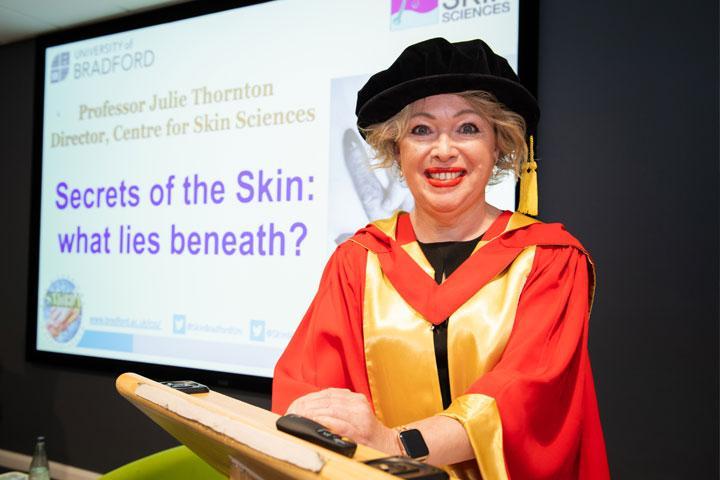Professor Julie Thornton
Secrets of the Skin: What Lies Beneath?

Your skin is your largest organ, comprising 15% of your body weight and an area of approximately 2m2. Its diverse functions include protection, communication, hormone synthesis, regulation of body temperature and sensory perception. It has an amazing ability to regenerate and is home to 1.5 trillion “friendly” bacteria.
Skin conditions are the most frequent reason for consultation in general practice, ranging across the life span from babies to the elderly. Without good skin health, quality of life is compromised, and chronic skin conditions present a high economic burden. For example, infected wounds limit independence, particularly in the elderly, and their management alone utilises 5.5% of total NHS expenditure. Melanoma skin cancer has risen significantly becoming the 5th most common cancer in the UK, while damage to the skin e.g., burns, open wounds and diabetic foot ulcers, risk infection by pathogenic bacteria leading to life-threatening conditions such as sepsis.
This fascinating, complex organ, including its most famous appendage – the hair follicle - has been the focus of Julie’s research for over 30 years. Her research started with her PhD studying the hair follicle, a mini organ with stem cell populations that allow it to recapitulate embryogenesis and tissue remodelling in an adult tissue. Julie’s long-standing collaboration with the Plastic Surgery and Burns Research Unit, has led to a greater understanding of the benefit of stem cells on wound healing in damaged skin.
Julie has also collaborated extensively with industrial partners including Estée Lauder on skin ageing. With ageing, our skin is subjected to chronic inflammation (inflammaging), which impacts significantly on its important functions.
Julie is currently leading a new, multi-disciplinary Skin in Healthy Ageing network, as part of a larger exploration of ageing science in the UK. Because skin can reflect underlying health issues, understanding these changes will also give insights to ageing in the rest of our body.
Watch the event recording on our Youtube channel.
